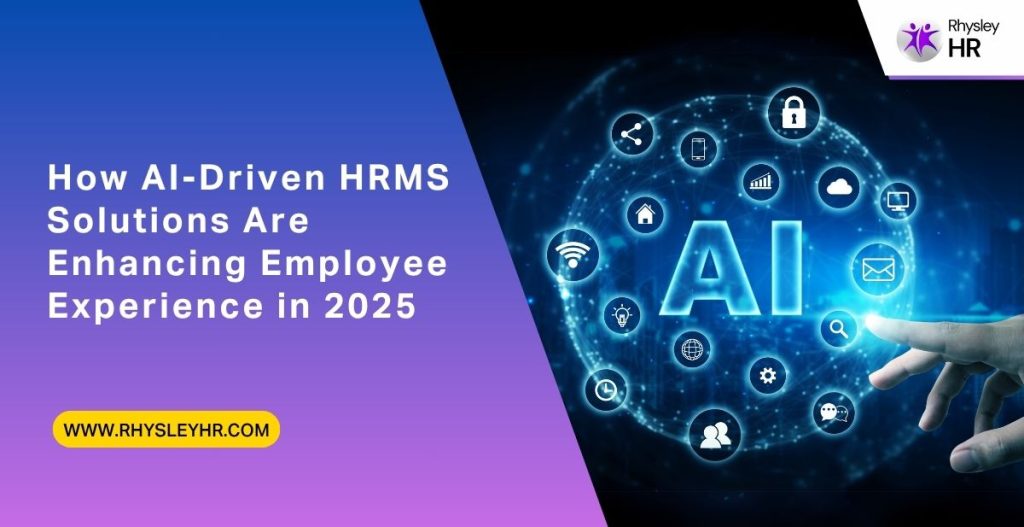Explore all premium features with a 1-Year Free Trial. Schedule your demo NOW!

How AI-Driven HRMS Solutions Are Enhancing Employee Experience in 2025
Modern organizational dynamics are undergoing a significant transformation, with human resource management evolving far beyond traditional practices through the integration of advanced technologies.
Recent industry reports reveal that nearly 78% of companies have either adopted or are in the process of implementing AI-driven HRMS software, representing a 340% surge in adoption compared to pre-2023 levels. Additionally, data indicates that organizations leveraging artificial intelligence in their HR operations experience a 42% improvement in employee satisfaction and a 31% decrease in administrative workload.
Market analysis shows that global spending on intelligent HRMS systems reached $18.6 billion in 2024, with projections estimating this figure will climb to $29.4 billion by 2026. These trends highlight the profound role of AI in reshaping how organizations across industries manage, support, and enhance their human capital.
The Evolution of HRMS Technology
Traditional HR systems were primarily designed for administrative functions and basic data management. In contrast, HRMS software 2025 trends highlight a major evolution toward intelligent, predictive, and highly personalized platforms.
Modern intelligent HRMS systems now utilize machine learning, natural language processing, and predictive analytics to deliver intuitive and seamless experiences that anticipate employee needs before they surface.
The adoption of AI technologies has elevated HRMS from being merely reactive administrative tools to proactive, strategic solutions that actively enhance employee engagement, satisfaction, and retention.
Organizations that deploy these advanced platforms consistently report marked improvements in both operational efficiency and overall employee experience.
Key Features Driving Enhanced Employee Experience
Customized Employee Experiences
Advanced AI-powered HR solutions enable the creation of highly personalized employee journeys. These platforms assess individual preferences, career ambitions, and behavioral tendencies to deliver tailored content, learning suggestions, and growth opportunities.
Employees receive customized notifications about relevant job openings, training sessions, and company events that match their interests and professional goals.
Enhanced Self-Service Features
HR technology trends for 2025 highlight the significance of empowering staff through intelligent self-service portals. AI-driven chatbots and virtual assistants offer instant answers to employee questions, whether it’s about benefits or company policies.
These tools understand natural language queries and provide accurate, context-aware responses around the clock, reducing the need to wait for HR support during office hours.
Forecasting Career Paths with Predictive Analytics
Smart HRMS solutions leverage predictive analytics to identify skill gaps, forecast career paths, and suggest development opportunities. By examining performance metrics, learning patterns, and industry trends, these systems help employees make well-informed decisions about their career growth while enabling organizations to proactively address talent development needs.
Streamlining HR Processes Through Automation
Advanced Recruitment and Onboarding
AI-powered HRMS solutions have transformed talent acquisition by automating tasks like resume screening, candidate matching, and interview scheduling. These systems can pinpoint the most suitable candidates by evaluating skills, experience, and cultural fit.
The onboarding process has also been enhanced, with AI crafting personalized onboarding experiences that facilitate smooth integration for new hires into their roles and the company culture.
Revolution in Performance Management
Traditional yearly performance reviews are being replaced by continuous, AI-supported feedback systems. These platforms analyze a range of performance metrics, peer input, and goal progress to deliver real-time insights into employee performance.
Managers receive data-driven suggestions for coaching and development, while employees gain transparent visibility into their progress and areas for growth.
Smart Workforce Planning
HRMS trends for 2025 include advanced workforce planning features that leverage AI to forecast staffing requirements, identify retention risks, and optimize resource distribution.
By analyzing historical data, industry trends, and organizational objectives, these systems provide strategic insights that enable better-informed decision-making.
Benefits for Employee Engagement and Satisfaction
Real-Time Feedback and Recognition
AI-enabled systems support ongoing feedback processes that keep employees engaged and motivated. These platforms can detect achievement trends and automatically activate recognition programs, ensuring exceptional contributions are acknowledged immediately.
Such instant recognition boosts morale and encourages positive behaviors within the organization.
Work-Life Balance Enhancement
The advantages of AI-driven HR software also include supporting employees in maintaining a healthy work-life balance. These systems track workload patterns, identify signs of burnout, and recommend schedule adjustments or wellness initiatives.
By proactively promoting employee well-being, organizations can decrease turnover rates and enhance overall job satisfaction.
Improved Communication and Collaboration
Modern HRMS platforms incorporate AI-powered communication tools that promote better teamwork across departments. These systems can suggest the best meeting times, identify subject matter experts for specific projects, and facilitate knowledge sharing based on individual skills and availability.
Conclusion
In summary, the integration of advanced AI technologies into HRMS platforms is revolutionizing the way organizations manage their human capital. From personalized employee experiences and proactive talent development to streamlined processes and improved engagement, these innovations are driving significant operational efficiencies and elevating employee satisfaction.
As global investments in intelligent HR solutions continue to grow, companies that embrace these technological advancements will be better positioned to foster a motivated, agile, and resilient workforce in the evolving landscape of modern work.